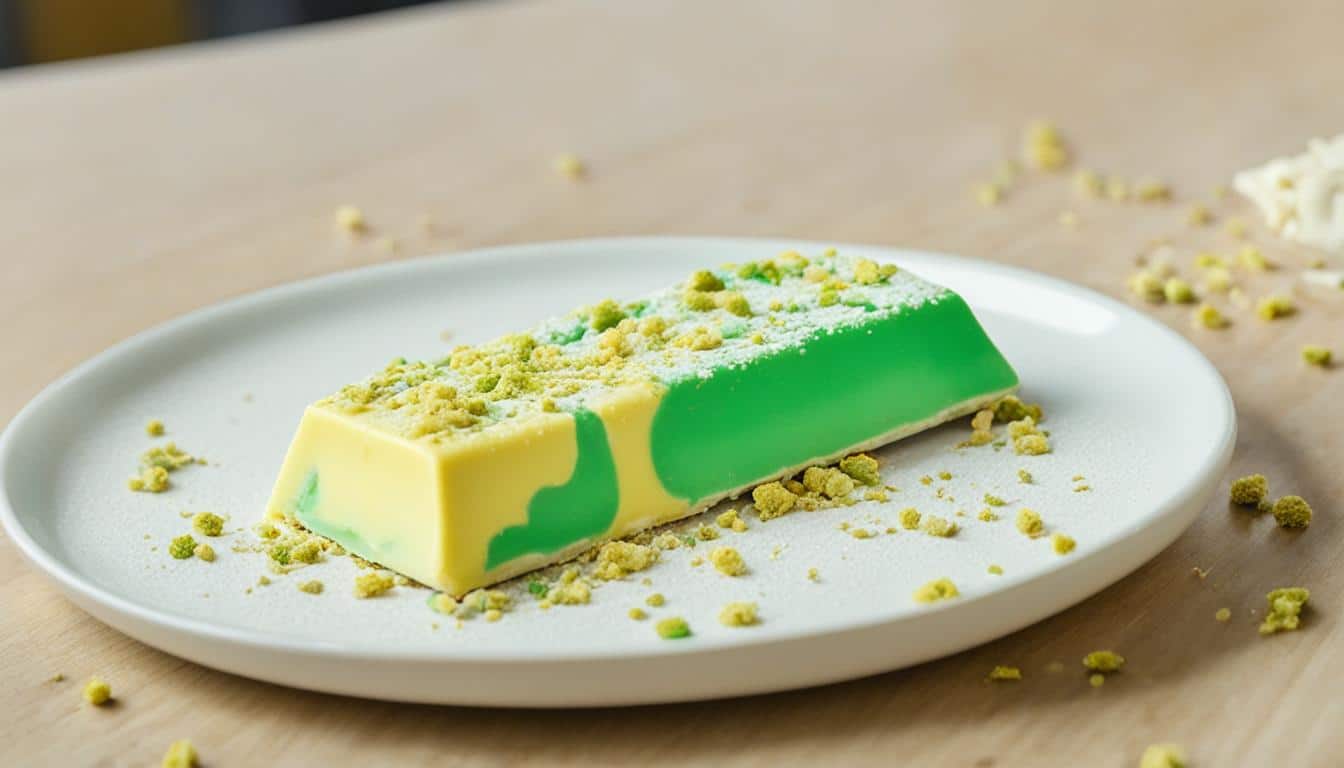
White chocolate is a sweet treat that many people enjoy. However, some individuals may wonder if consuming white chocolate can make them sick. In this section, we will explore the potential risks associated with white chocolate consumption and whether it can lead to illness. We will discuss the harmful effects of white chocolate and whether there have been any reported cases of white chocolate food poisoning.
Key Takeaways:
- Consuming white chocolate may pose potential risks to some individuals.
- Harmful effects and food poisoning may result from white chocolate consumption.
- It is essential to be aware of the possible risks associated with white chocolate.
White Chocolate and Health Concerns
While white chocolate is a popular and beloved treat, it is important to consider the potential health concerns associated with its consumption. One of the primary concerns is the prevalence of white chocolate allergies and intolerances.
Individuals who are allergic to milk or dairy products may experience adverse reactions after consuming white chocolate. This is because white chocolate contains milk solids, which can trigger an allergic response in some individuals. Symptoms of a white chocolate allergy may include hives, swelling, and difficulty breathing.
In addition to allergies, some individuals may also experience difficulties digesting white chocolate due to lactose intolerance or sensitivity. This can lead to stomach issues such as bloating, gas, and diarrhea.
It is important to be vigilant about any potential sensitivities or allergies to white chocolate. If you experience any adverse reactions after consuming this treat, it is recommended to consult a medical professional and avoid consuming white chocolate in the future.
Preventing White Chocolate Allergies
For individuals who love white chocolate but are allergic or intolerant, there are several alternatives that can be enjoyed. Dark chocolate, for example, typically contains fewer milk solids and may be a better option for those with allergies or sensitivities to milk products.
“It’s important to be aware of any food allergies or intolerances you have, and to be cautious when consuming foods that may trigger an allergic response.”
To avoid any unwanted reactions, be sure to read food labels carefully and avoid consuming foods that contain any ingredients that cause an allergic response. With a bit of caution and attention, it is possible to safely enjoy white chocolate without any adverse effects.
Potential Side Effects of White Chocolate
White chocolate is an indulgent treat that many people enjoy. However, consuming too much of it can lead to potential side effects. Let’s take a closer look at some of the possible adverse effects that may be associated with eating white chocolate.
White Chocolate and Stomach Issues
One of the most common side effects of consuming white chocolate is stomach discomfort. White chocolate contains high amounts of sugar and fat which can lead to gastrointestinal problems, such as stomach cramps, bloating, and diarrhea. Individuals with sensitive stomachs may experience these symptoms more severely.
To avoid experiencing these types of stomach issues, it’s recommended to practice moderation when it comes to consuming white chocolate. It’s also important to pay attention to your body’s response to white chocolate and limit your intake if you notice any discomfort.
Other White Chocolate Side Effects
In addition to stomach issues, there are other potential side effects associated with white chocolate consumption. These may include headaches, skin irritation, and mood swings. While these side effects are not as common as stomach issues, some individuals may experience them after consuming white chocolate.
Note: If you experience severe symptoms after eating white chocolate, such as difficulty breathing or swelling of the face, seek medical attention immediately. These symptoms may be indicative of a more severe reaction or allergy.

“Moderation in all things, including white chocolate consumption, is key to maintaining a healthy balance and avoiding unpleasant side effects.”
Understanding White Chocolate Composition
White chocolate is a popular confectionery made from sugar, milk solids, and cocoa butter. Unlike dark or milk chocolate, white chocolate does not contain cocoa solids, which are responsible for chocolate’s health benefits. While white chocolate is safe to eat for most people, it’s crucial to understand the ingredients used in its production to avoid any adverse effects.
In the United States, the Food and Drug Administration (FDA) mandates that white chocolate must have a minimum of 20% cocoa butter, 14% milk solids, and 3.5% milkfat. If a product doesn’t contain these minimums, it can’t legally be called white chocolate. Additionally, to ensure white chocolate is safe to eat, manufacturers must adhere to strict hygiene and safety standards.
The Ingredients of White Chocolate
| Ingredients | Function |
|---|---|
| Cocoa butter | Provides the texture, flavor, and melting point |
| Milk solids | Contributes to the color, flavor, and nutritional content |
| Sugar | Provides sweetness and acts as a preservative |
| Lecithin | Helps blend all the ingredients together and improve texture |
| Vanilla | Imparts a distinct flavor and aroma |
While these ingredients are generally safe, some individuals may be allergic or intolerant to specific components. For instance, lactose intolerance affects individuals who are unable to digest lactose, a natural sugar found in milk and dairy products. Similarly, some individuals may be allergic to cocoa butter, milk solids, or soy lecithin, a common ingredient in white chocolate.
In conclusion, understanding the composition of white chocolate is crucial to determine whether it’s safe to eat. While white chocolate may not be as beneficial as dark or milk chocolate, it’s an enjoyable treat for many people. However, if you have any allergies or intolerances, it’s essential to read the label and speak with your doctor to determine if white chocolate is safe for you to consume.
White Chocolate and Food Allergies
If you suffer from food allergies, it is important to be aware of the potential allergens present in white chocolate. While white chocolate may not contain cocoa solids, it still contains milk and soy, which are common allergens. As such, individuals with dairy or soy allergies should approach consuming white chocolate with caution.
“White chocolate often contains milk and soy, which can trigger allergic reactions in sensitive individuals. Anyone with known allergies should always read ingredient lists before indulging in this sweet treat.”
It is essential to always read the ingredient list before consuming any white chocolate product to avoid any adverse allergic reactions. If you have a severe allergy, it may be best to avoid white chocolate altogether and opt for other chocolate varieties that are free from milk and soy.
Conclusion
In conclusion, consuming white chocolate may not necessarily make everyone sick. However, it is important to be aware of any allergies or intolerances one may have towards it. It is crucial to practice moderation and understand the ingredients used in white chocolate to enjoy this treat without adverse effects.
FAQ
Can white chocolate make you sick?
Consuming white chocolate in moderation is unlikely to make you sick. However, excessive consumption may lead to symptoms such as nausea or indigestion.
What are the harmful effects of white chocolate?
White chocolate is generally considered safe to consume. However, it is high in sugar and saturated fats, which may contribute to weight gain and increase the risk of certain health conditions when consumed in large quantities.
Is there a risk of white chocolate food poisoning?
White chocolate is not commonly associated with food poisoning. However, it is important to ensure that white chocolate is stored properly and not past its expiration date to avoid the growth of harmful bacteria.
Are there any white chocolate allergies?
While allergies to white chocolate specifically are rare, some individuals may have allergies to ingredients commonly found in white chocolate, such as milk or soy. It is important to read labels carefully and be aware of any potential allergens.
Can white chocolate cause stomach issues?
Some individuals may experience digestive discomfort or stomach issues after consuming white chocolate, especially if they have lactose intolerance or are sensitive to rich and fatty foods. Moderation is key to avoiding these potential side effects.
What are the side effects of white chocolate?
The most common side effects of consuming white chocolate include weight gain, increased cholesterol levels, and potential dental issues due to its high sugar content. However, these side effects are generally associated with excessive consumption.
Is white chocolate safe to eat?
White chocolate is safe to eat as long as it is consumed in moderation and does not cause any adverse reactions in individuals with specific allergies or intolerances. It is important to check the ingredients and choose high-quality white chocolate from reputable brands.
